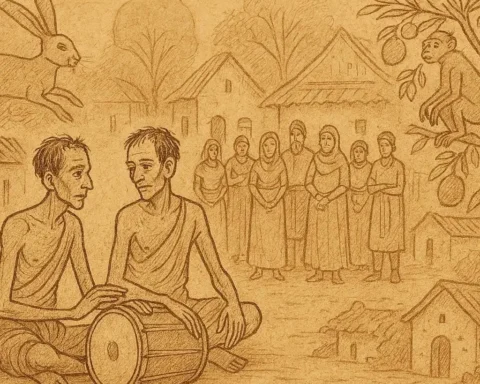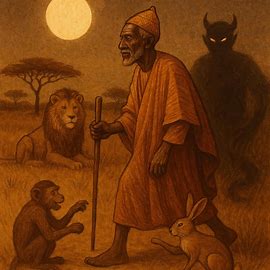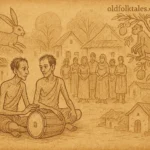In the rugged heart of eastern Algeria rise the Aurès Mountains, home to the Chaoui people. The ridges are sharp, the valleys deep, and the wind carries voices that sound like ancestors speaking. Around evening fires, the Chaoui elders remind the young ones: the mountains are never silent.
This is one such story, a Chaoui folktale passed down from those who lived before us. It is the tale of The Spirit of the Aurès Mountains.
The Vanishing Spring
Long ago, before villages had roads or stone houses, the people of the Aurès lived close to the earth. They kept goats, planted barley, and drew water from a spring that gushed clear and strong at the base of the mountain.
One summer, the spring dried. The ground cracked, jars lay empty, and goats cried for water. The elders searched for answers, and they declared: “The spirit of the Aurès has taken our water. We must ask its mercy.”
But who among them had the courage to face the mountain spirit?
In the village lived a girl named Tasnime. She was small, with eyes that watched storms instead of hiding from them. Her grandmother always told her, “Child, the mountains are alive. Treat them with respect, for they listen.”
When the people hesitated, Tasnime stepped forward. “I will go.”
The men laughed. “You are but a child!” But her grandmother touched her shoulder and said, “Sometimes it is the small voice that is heard most clearly.”
The Climb into the Mountains
At dawn, Tasnime began her journey. She carried bread, a flask of goat’s milk, and a string of blue beads her grandmother had given her. “These will protect you,” the old woman said.
The climb was steep. The sun burned her skin, the rocks tore her sandals. She passed groves of cedar where owls called in warning, and valleys where silence pressed on her chest. Yet she pressed forward.
On the third day, she reached a cave. From within, a glow pulsed like fire behind stone. The wind whistled through the rocks like a flute. Tasnime gathered her courage and stepped inside.
The Spirit Appears
The cave trembled. Out of smoke and shadow rose a spirit taller than the cedars. Its eyes burned red, its voice rolled like thunder.
“Child,” it said, “why do you disturb me?”
Tasnime knelt, though her voice did not shake. “Great spirit of the Aurès, my people thirst. Our spring is gone. Why have you taken it?”
The spirit’s eyes narrowed. “Because your people forget. They cut the trees without planting new ones. They waste the water. They no longer sing thanks to the mountains. If they treat the earth with neglect, why should the mountains feed them?”
Tasnime bowed her head. “Then teach us again. If you return the water, I will carry your lesson home.”
The cave rumbled. At last the spirit said, “Your words are honest. Place your beads on the stone at the cave’s mouth. Each year, if the people replace them with new ones, the spring will flow. If they forget, it will vanish once more.”
Tasnime laid the beads on the stone. Immediately, a sound like rushing water filled the air. At the foot of the mountain, the spring gushed forth again, brighter and stronger than before.
The Return
When Tasnime returned to the village with a jar of fresh water, the people rejoiced. The elders bowed and said, “Your courage saved us.” Her grandmother wept with pride.
From that day onward, each year, the people of Thigharghar tied blue beads on the stone at the cave’s mouth. They sang to the spirit, promising never to forget again.
The spring never failed, so long as the beads were renewed. And Tasnime, though still young, became known as the girl who spoke to the mountain spirit. Her story was told by firesides, reminding the Chaoui people that the Aurès were alive, listening, and deserving of respect.
Moral Lesson
This Chaoui folktale teaches that nature is not ours to use without care. The earth listens, the mountains remember. When people neglect the land, hardship follows, but humility and respect can restore balance. Even the smallest voice, if honest, can speak for an entire people.
Knowledge Check
1. What is the Chaoui folktale The Spirit of the Aurès Mountains about?
It is the story of a girl named Tasnime who confronts the spirit of the Aurès Mountains to restore her village’s lost spring.
2. Why did the spring vanish in the Chaoui folktale?
The spring dried up because the villagers had neglected and disrespected nature by cutting trees and forgetting their traditions of gratitude.
3. What role did Tasnime play in the Chaoui folktale?
Tasnime was the brave child who faced the mountain spirit with humility and honesty, securing the return of the water.
4. What is the significance of the blue beads in the story?
The blue beads symbolized a promise between the villagers and the spirit. Replacing them each year showed respect and ensured the spring would flow.
5. What is the moral lesson of The Spirit of the Aurès Mountains?
The folktale teaches respect for nature, humility in asking for help, and the power of even a small voice to bring change.
6. How does this Chaoui folktale reflect Berber oral tradition?
It reflects oral tradition by preserving lessons of respect, spirituality, and harmony with the land through storytelling passed down across generations.






